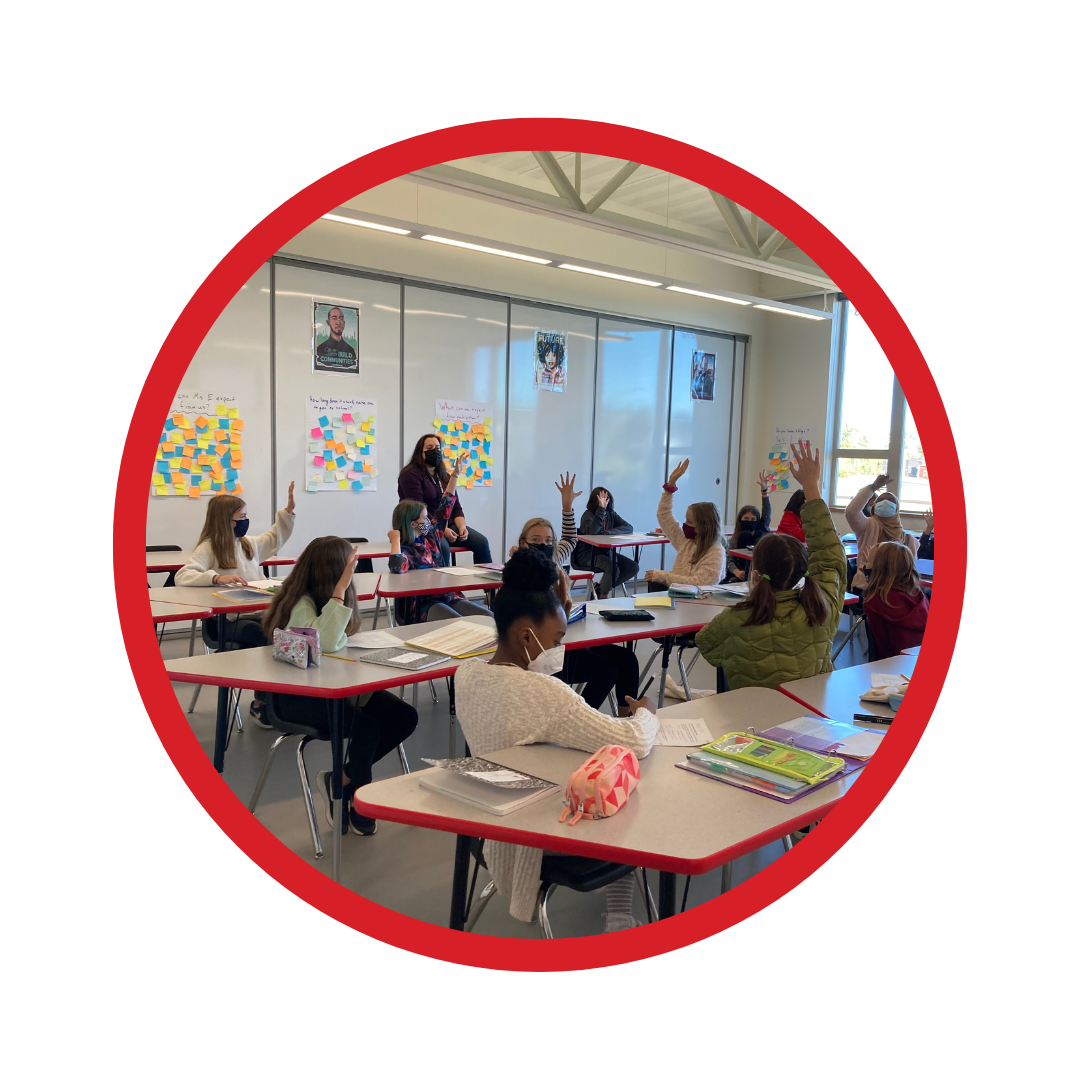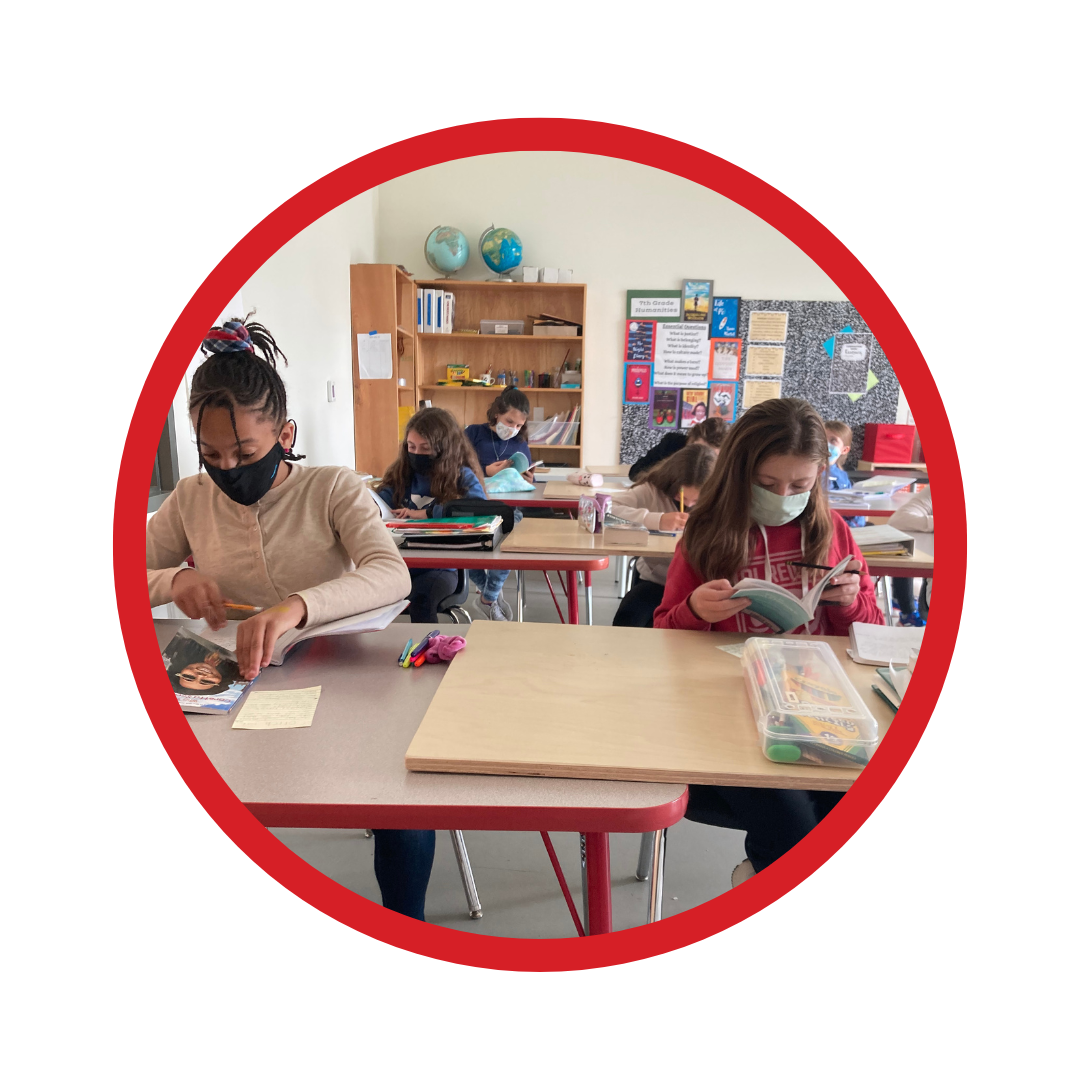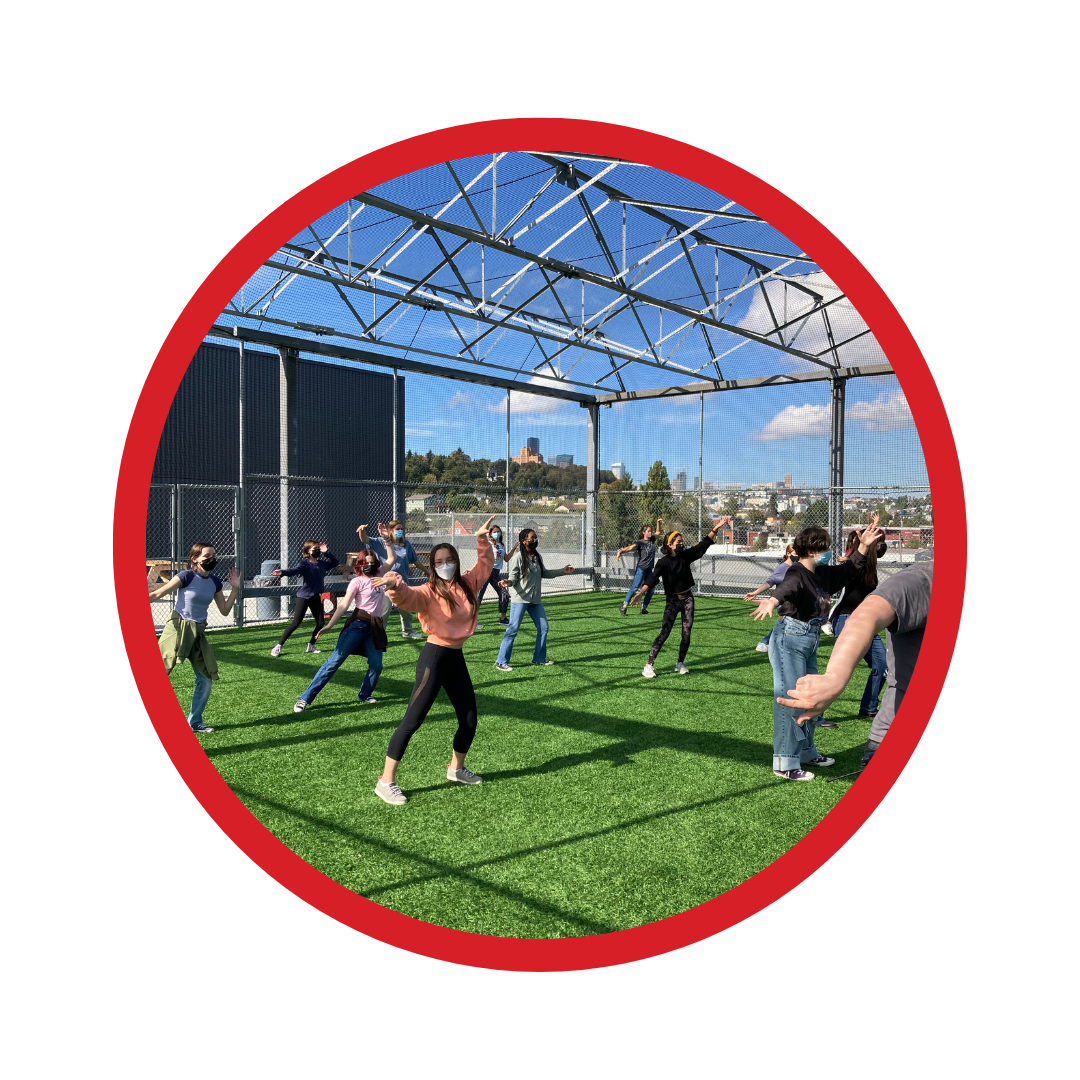7th Grade at L-Dub
This class emphasizes the importance of clear writing and close reading. Students write to convey ideas, using academic writing as well as personal writing to develop critical thinking skills and to discover more about themselves. Using the writing process, students communicate those understandings clearly and creatively while learning and applying grammatical and mechanical rules to their writing. Students consistently engage in the processes of revision, editing, and proofreading as they develop the tools used in generating clarity and precision. Active reading skills are utilized in all texts as students annotate and compose reading notes.
The course content focuses on world religions as students explore the development of culture in world history. Beginning with ancient religions of Hinduism, Buddhism, and Confusiansim, students explore the ideas of how religions develop and meet the needs of human experiences.
Using the Abrahamic faiths of Judaism, Christianity, and Islam, students engage in comparative studies of how religions are connected to each other while remaining distinct aspects of cultures and civilizations. Finally, through an examination of Pacific Northwest Native Tribes, seventh grade investigates the role of spirituality and religion in indigenous societies. The social studies curriculum teaches and practices skills in reading comprehension, writing, oral presentations, study techniques, and research assignments. Critical thinking skills are emphasized in all units especially when analyzing, examining, and writing about historical events. These analytic skills are honed with written assignments, group projects, oral presentations, and class discussions.
Science at L-Dub is framed by the following four questions: How do scientists work together? How do scientists ask questions and find answers? How does science connect to your life? How do scientists make sense of "failure"? Seventh-grade science focuses on the human body as well as supporting students to use science as a means to better understand and ignite change in their communities.
Students explore the major systems of the human body, including the brain and nervous system, cardiovascular and respiratory system, and genetics and heredity. They participate in a research project on a public health topic of their choice, in which they design a research question and investigation, collect and analyze data, and present their findings to the school community and public health mentors.
Each unit is centered around an essential question that students explore through lab investigations, simulations, readings and media, class discussion, and lecture. Throughout the year, students develop their skills in scientific modeling, data analysis, designing investigations, scientific argumentation, developing hypotheses and inferences, and scientific literacy. Students are assessed through unit quizzes, presentations, discussions, lab reports, in-class assignments, collaboration, and participation.
The focus for seventh-grade math is to develop students’ understanding of proportional reasoning and the use of variables to represent mathematical relationships. Students work on developing their numeracy skills through continued practice with rational numbers, including positive and negative whole numbers, fractions, and decimals. They will then use these skills to make sense of proportional relationships. Working with these concepts will prepare students for the challenges of the abstract concepts found in algebra, and eventually, geometry courses. They will also study new ideas involving data and geometric figures. Students will be assessed using regular exit tickets, checkpoints, and quizzes. Assessments in the form of tests and projects will occur in each unit.
The LWGMS STEAM (Science, Technology, Engineering, Art, and Math) curriculum seeks to produce creative problem-solvers who are undeterred by failure. STEAM class is designed not only to excite students about engineering, technology, science, and math but also to allow them to apply their knowledge of those disciplines in a creative, hands-on way. Each STEAM project connects to content from students’ art, math, and science classes and exposes students to design thinking, coding, robotics, woodshop, maker space tools, and circuitry. In this once-a-week class, students collaborate with their peers to solve design challenges and build prototypes, developing their interpersonal and project management skills. Students are assessed on their final product, reflections on and engagement in the design and building stages, collaboration, and participation.
The focus for seventh grade Spanish is to expand upon skills for language learners, deepen the understanding of Spanish-speaking communities at local and international levels, and further consider the significance of language learning. In class, students will engage in thematic units related to the culture and history of the Spanish-speaking world. Themes covered in these units include Día de Los Muertos, indigenous communities and civilizations, and the origins of Spanish and its arrival to the Americas.
In seventh grade, students continue to develop oral and written communication proficiency, building upon vocabulary and present tense grammatical skills. Through the use of communication- and task-based activities, movement and games, songs, projects, and partner and group work, students practice and apply their Spanish. Students have regular homework practice and are assessed both formally and informally through regular class activities, skill checks, projects, performance tasks, and written unit assessments.
In this course, students will learn to use a variety of art tools and techniques, as well as explore the elements of art and principles of design to create original works of art with a focus on both process and product. Furthermore, students will learn about art history and develop a vocabulary to discuss and critically examine works of art and make connections to the world around them. Throughout the year, students will work with ink, pencil, sculpture, fiber, paint, and printmaking. Students will also engage in a feedback process to give thoughtful and constructive feedback to peers, and apply feedback as they develop their own artworks. At the end of the year, student work is displayed at the annual art show. Students are assessed on craft, feedback, production, and learning behaviors.
The Theatre Arts program at L-Dub is an opportunity for students to work together as they build strong voices, strong minds, and strong bodies. Through script analysis, interpretation, and memorization, students develop strong minds; by learning to perform on stage, students develop strong voices; and finally, through learning to use physical movements to express emotion and meaning, students develop strong bodies.
The Theatre Arts program also provides opportunities for students to practice teamwork and leadership skills. As members of a cast and crew, the students must learn to work together and be responsible on both an individual level as well as for the entire group. In addition to performing as actors, students take on leadership roles in stage management, lighting, sound, set design, assisting the director, and choreographing musical numbers. Through two one-act shows, seventh-grade students take ownership in both the acting and technical aspects of the production and perform for the school community. The seventh-grade productions rely on teamwork and peer support for success; consequently, with every show, the students learn to work cohesively and collaboratively. The process of creating a show is filled with opportunities for social and emotional learning and the personal growth that results from meeting challenges and taking appropriate risks. Students are assessed based on their mastery of basic theatre skills such as memorization, projection, dictation, and audience awareness.
Our Mind, Body, Voice class will be taught as a trimester class. Sixth grade students will take the MBV class first trimester and will begin their middle school experience building community with classmates, and learning about organization and time management with direct instruction on how to use the L-Dub planner. During the MBV class, all students will have the opportunity to build community, set goals and intentions for the year, learn about adolescent brain development and how this translates to behavior and skill acquisition during their specific developmental period of adolescence. Moreover, all students will learn about the importance of executive function skills and how best to organize themselves in school. In addition, topics focused on social-emotional learning such as self-awareness, self-management and emotional regulation, personal values, social awareness, empathy and perspective taking, decision making, relationship skills, puberty and health, and identity will be covered. Students will have the opportunity to reflect on and explore their knowledge of themselves as individuals, to learn about their peers, and to understand how they have an impact on their community. Classes will be a combination of lecture, group discussion, and journal entries.
The goal of the physical education (PE) program is to help
develop strong, confident, and well-balanced individuals. Students participate in a variety of physical activities and learn the role movement plays in their overall health and well being. Each student takes three terms of PE and may take additional fitness-related courses through L-Dub enrichment programs. Each grade level will progress from basic large motor skills to smaller motor skills utilizing more compound movements. Seventh grade is expected to learn form, body awareness, and a basic understanding of healthy behaviors. Students will be able to demonstrate and explain
various activities and the role these movements play in building and maintaining healthy lifestyles, while creating and tracking their individual SMART goals. Students are assessed on learning behaviors in daily lessons as well as on the overall progress they have made for each skill.
L-Dub offers a variety of electives based on student interest and teacher expertise. The goal of this enrichment program is to provide students with skills and opportunities beyond their regular academic program. The design of the enrichment program reflects the belief that students should have choice in their learning and opportunities to explore and expand their individual interests, skills, and passions. L-Dub enrichment classes are often project-based, and they allow students to create products to publish, perform, or display in class. The enrichment program gives students opportunities to work in groups and on subject matter that relates to real-world experiences. These classes rotate three times per year and students are assessed on learning behaviors.
In the current trimester, we offer the following electives:
- Art
- STEAM
- Coding
- Current Events
- Model UN
- Geometry
- Journalism
- Yearbook
"L-Dub helped give me so much confidence. Whether it was poetry night in front of the whole school or learning to share my thoughts in class, L-Dub’s special curriculum helped to teach me that my voice matters. It also really helped that the teachers support every student and promote a comfortable environment for the student community. I can’t wait to see what else L-Dub is all about in my final two years."

"L-Dub is sort of magical because people are kind to each other and we treat one another with grace and respect, which is pretty unique for a middle school!"
"I feel comfortable with myself and changing because I know people at L-Dub won't judge me"





